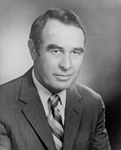Campaign
Despite the state's Republican lean in the presidential race, Williams was the heavy favorite for re-election due to his personal popularity. On a campaign stop in late October, Walter Mondale called Williams "the most popular Senator in Washington." [4]
Norcorss ran on a moderate platform, calling for adjustments to Medicare to ensure "more preventive care and less need for institutionalization" and expanded access to Social Security benefits for high earners. He attempted to appeal to urban voters by calling for tax deductions for mass transit and an expanded loss deduction for small business owners who were victims of crime. [4]
Norcross attempted to use his expert knowledge of campaign finance to attack Williams as a "special interest" legislator engaged in an "odd-couple relationship by wooing both organized labor and banking and securities interests". Norcross singled out fundraising dinners at which Williams accepted donations from representatives of banks and securities firms which appeared before the Senate Subcommittee on Securities, which Williams chaired. "The subcommittee was considering important legislation affecting the securities industry, and the House legislation was considerably watered down when it came up for a Senate vote," Norcross said. "This is not just a campaign-funding issue; it goes to the integrity of the legislature." [4]
However, Norcross never gained traction with the electorate; he failed to raise enough money for radio or television advertising. Even several weeks into the campaign, polls showed that few voters knew his name. [4] When President Gerald Ford visited the Paramus to campaign, he chose to have U.S. Senator Clifford Case on stage rather than Norcross. [4]



